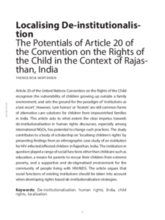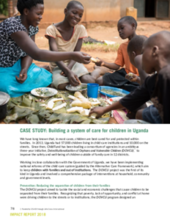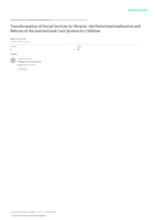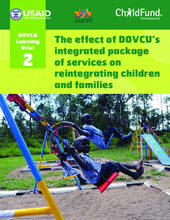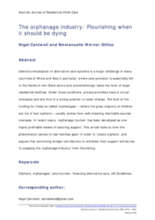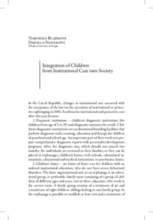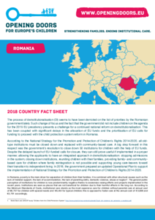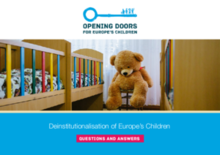Displaying 271 - 280 of 691
Exploring the testimonials collected during a focus group and 45 individual interviews with adult alumni of such institutions the Romanian research team enrolled in the SASCA Project revealed a wide range of forms of violence and traumatic consequences.
This study contributes to a body of scholarship on ‘localising children’s rights’ by presenting findings from an ethnographic case study of an institution for HIV-infected/affected children in Rajasthan, India.
This case study from ChildFund's 2018 Impact Report describes the Deinstitutionalization of Orphans and Vulnerable Children (DOVCU) initiative in Uganda, which aims to to improve the safety and well-being of children outside of family care.
This article focuses on the study of current transformation processes occurring in Ukraine in the provision of social services to various groups of children, in particular orphan children and children deprived of parental care.
This learning brief analyzes quantitative data from the second of the “Deinstitutionalization of Orphans and Vulnerable Children in Uganda” (DOVCU) project’s stated objectives: examining the extent to which DOVCU project interventions decrease vulnerabilities for reintegrating children and their families.
This article looks at how the orphanage industry serves to tear families apart in order to ‘create orphans’, and argues that convincing foreign contributors to withdraw their support will be key to stopping the ‘orphanage industry’ from flourishing.
This article describes the changes in institutional care in the Czech Republic that were ushered in with the acceptance of the law on the execution of institutional or protective upbringing in 2002.
In 2018, there were still 185 institutions in Romania housing 6,632 children. 2,997 children with disabilities were living in 81 institutions for children with disabilities in Romania. The majority of children in out-of-home care were placed in family based care, including 18,317 children in foster care and 18,437 children in kinship care.
This session of the World Travel Market in London focused on orphanage tourism and featured speakers from the Better Volunteering Better Care Initiative and other partners, including Save the Children, Friends International, Lumos, and People and Places.
This resource provides quick answers to some of the frequently asked questions about the transition from institutional to family- and community-based care for children, also known as deinstitutionalisation (DI).

